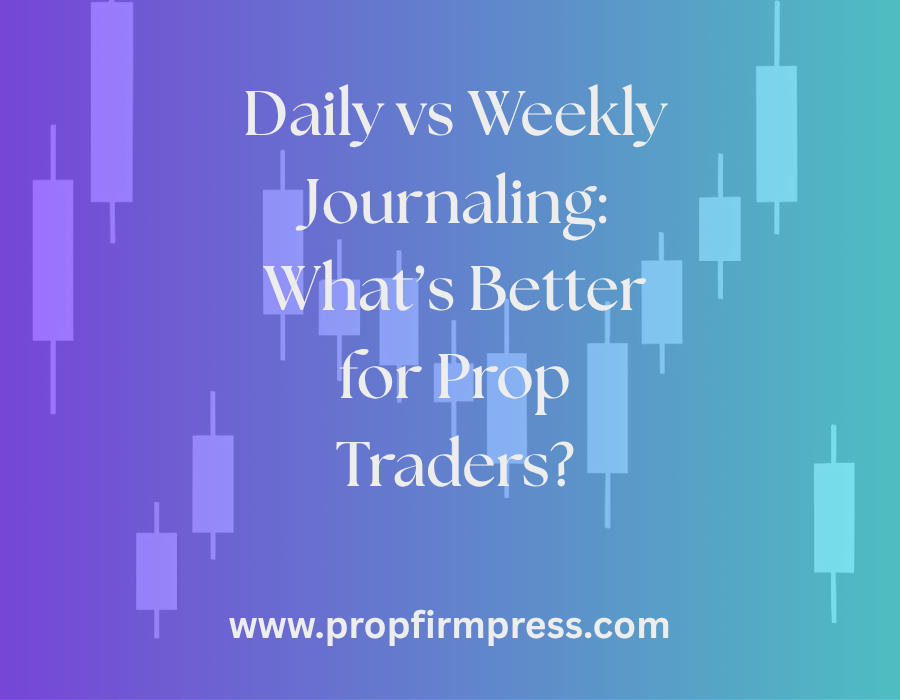The Journaling Debate: Daily or Weekly for Prop Traders?
Every serious prop trader understands that journaling is critical for growth—but when it comes to deciding between daily and weekly journaling, opinions vary. Some traders swear by daily trade logs for emotional clarity and real-time accountability. Others find more value in stepping back once a week to evaluate their overall behavior and performance. So which one is better for prop firm success? The truth is, both serve unique purposes. The best approach depends on your trading style, time commitment, and the level of data you want to extract. If you’re trading with firms like Prop Shop Traders, Blue Guardian, or Funded Futures Network, choosing the right journaling rhythm could mean the difference between passing a challenge or resetting it unnecessarily.
What Daily Journaling Offers That Weekly Reviews Don’t
Daily journaling captures fresh emotions, market context, and trade-by-trade rationale. It’s your closest lens to the actual decision-making process and how emotions impacted each trade. When recorded immediately after a session—or even after each trade—it paints a vivid picture of how and why you did what you did.
Benefits of daily journaling:
- Captures raw emotion: You can note frustration, overconfidence, or fear immediately after trades.
- Reinforces process: Writing down why a trade was taken helps reinforce strategy rules.
- Tracks discipline: You’ll know instantly if you followed your risk plan or not.
- Identifies subtle behavioral shifts: Like trading more aggressively after a win or hesitating after a loss.
Daily journaling is especially helpful during prop firm evaluations when you’re trying to build consistency, avoid breaking rules, and maintain discipline under pressure. The smaller your account size or risk buffer, the more important real-time reflection becomes.
The Power of Weekly Journaling: Bird’s-Eye View
Weekly journaling serves a different purpose—it connects the dots. Instead of analyzing individual trades, it examines broader patterns across a set of days. This helps traders avoid overreacting to isolated mistakes and gives a sense of progression over time.
Key advantages of weekly reviews:
- Spotting macro-level patterns: Are you overtrading on Fridays? Do you perform poorly after three green days?
- Emotional trends: Are you calmer early in the week and more impulsive later?
- Evaluating goal progress: Did you follow your weekly objectives? Did you avoid emotional trades?
- Consolidation of data: Instead of pages of daily notes, you summarize key themes.
Many traders use weekly journaling to reflect after the markets close on Fridays or Sundays. This also aligns well with preparing for the week ahead—setting goals, reviewing past behavior, and resetting emotionally.
Which One Helps More With Prop Firm Evaluations?
During the evaluation phase, daily journaling often has more immediate benefits. That’s because every trade matters when you’re working within a 10% drawdown or 8% target limit. Being able to analyze and adjust behavior daily prevents the accumulation of compounding mistakes that lead to resets. However, once funded, weekly reviews become essential for long-term performance monitoring, especially when you’re trying to optimize your edge and avoid burnout.
Combining Both for Maximum Impact
Many traders combine both methods. They use a lightweight daily log and then complete a structured weekly review. For example:
- Daily: Trade details, screenshots, emotional rating, key mistakes
- Weekly: Totals, averages, goal progress, emotional trends, new action plan
The Ultimate Trading Journal Sheets are designed exactly for this dual method. They include daily entry pages with checklists, emotional ratings, and space for screenshots, followed by a weekly summary sheet with room to analyze progress, grade performance, and set next week’s focus.
Personality and Lifestyle Considerations
Some traders simply don’t have the time—or attention span—to journal daily. That’s okay. Weekly reviews offer a manageable rhythm for busy or part-time traders. However, if you find yourself repeatedly breaking rules or trading emotionally, switching to daily entries may be the correction you need. Think of journaling frequency as a behavioral thermostat: the more off-track you are, the more often you need to check in.
Questions to Help You Choose Your Method
- Do I often forget what I was thinking during a trade?
- Do I overreact emotionally and need a reset mechanism?
- Am I overwhelmed by too much journaling?
- Am I making the same mistakes week after week?
If you answered yes to the first two, you may benefit from daily journaling. If you answered yes to the last two, weekly journaling with a more focused scope may work better.
Case Study: Trader Using Both Approaches
One trader in the Funded Futures Network started journaling daily after hitting two resets in one month. They tracked emotions after each trade and noted that they tended to overtrade after lunch, especially when behind. By implementing a “stop-after-three-trades” rule and journaling that commitment daily, they passed their next challenge.
However, they later shifted to weekly reviews once funded, using Friday afternoons to reflect and set intentions. This dual approach helped them remain consistent and avoid performance drops common after receiving a funded account.
Using Templates to Streamline the Process
To make either journaling method sustainable, use ready-made layouts. The Prop Firm Press journal templates allow you to fill in trades quickly without needing to write essays. The daily pages take under 5 minutes, while the weekly review page provides structure so you don’t forget what to analyze.
The Bottom Line for Prop Traders
You don’t need to choose one or the other forever. Your journaling rhythm should evolve with your trading journey. Start with daily logs during the evaluation phase, then switch to weekly reviews once funded. If discipline slips or emotions return, add back the daily reflections temporarily. The key is that you’re journaling consistently—not just when you feel like it. That’s what sets funded traders apart.
